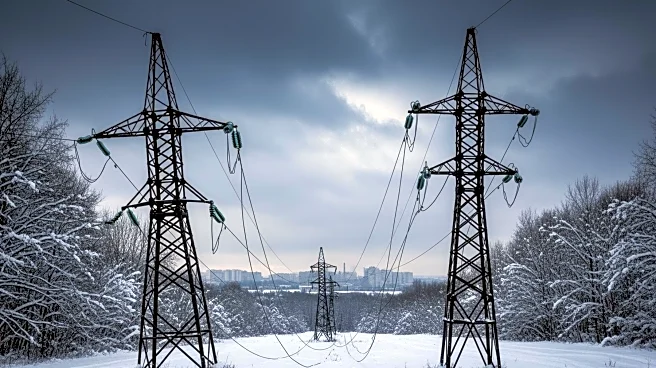What's Happening?
Russia has renewed its campaign of attacks on Ukraine's energy grid, leading to power cuts and blackouts as winter approaches. The attacks have targeted specific regions and gas infrastructure, affecting millions of Ukrainians. In Shostka, a town near
the front line, residents face long hours of darkness and rely on generators for power. The situation is particularly dire for individuals like Zinaida Kot, who requires dialysis treatment that depends on electricity. The attacks have grown more effective, with Russia using drones equipped with cameras to improve targeting and overwhelm air defenses.
Why It's Important?
The renewed energy assault by Russia highlights the ongoing challenges faced by Ukraine as it struggles to maintain essential services amid conflict. The blackouts have significant implications for public health, safety, and daily life, particularly for those dependent on electricity for medical treatments. The situation underscores the need for international support and intervention to protect Ukraine's energy infrastructure and ensure the safety of its citizens. The attacks also reflect broader geopolitical tensions and the impact of conflict on civilian populations, emphasizing the importance of diplomatic efforts to resolve the crisis.
What's Next?
Ukraine may seek further international assistance to bolster its energy infrastructure and improve air defenses against Russian attacks. The government and local authorities may implement measures to mitigate the impact of blackouts, such as increasing the availability of generators and establishing 'invincibility points' for residents. The situation may also prompt renewed diplomatic efforts to address the conflict and seek a resolution that ensures the safety and stability of Ukraine's energy supply. As winter approaches, the need for effective solutions becomes increasingly urgent.
Beyond the Headlines
The energy assault on Ukraine raises ethical and humanitarian concerns regarding the impact of conflict on civilian populations. It highlights the need for international cooperation to protect vulnerable regions and address the root causes of the conflict. The situation also underscores the importance of resilience and adaptation in the face of adversity, as communities find ways to cope with the challenges posed by blackouts and energy shortages. The broader implications of the conflict may influence global energy policies and efforts to ensure energy security in conflict-affected regions.
















